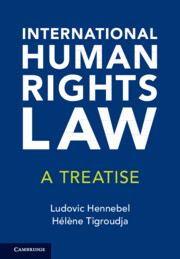Book contents
- International Human Rights Law
- International Human Rights Law
- Copyright page
- Dedication
- Contents
- About the Authors
- Acknowledgments
- Note on the Text
- Table of Cases
- Abbreviations
- Part I Foundations of International Human Rights Law
- Title 1 Theoretical Elements of International Human Rights Law
- 1 The Elusive Theory of Human Rights
- 2 The Idea of Human Rights
- 3 Exploring the Elusive Foundations of Human Rights
- 4 The Pragmatic Approach of International Human Rights Law
- Title 2 Normative Pluralism in International Human Rights Law
- Title 3 The Relationship Between International Human Rights Law and Other Branches of International Law
- Part II The Machinery of International Human Rights Law
- Part III The Interpretation of International Human Rights Law
- Part IV Remedies and Implementation of International Human Rights Decisions
2 - The Idea of Human Rights
from Title 1 - Theoretical Elements of International Human Rights Law
Published online by Cambridge University Press: 10 April 2025
- International Human Rights Law
- International Human Rights Law
- Copyright page
- Dedication
- Contents
- About the Authors
- Acknowledgments
- Note on the Text
- Table of Cases
- Abbreviations
- Part I Foundations of International Human Rights Law
- Title 1 Theoretical Elements of International Human Rights Law
- 1 The Elusive Theory of Human Rights
- 2 The Idea of Human Rights
- 3 Exploring the Elusive Foundations of Human Rights
- 4 The Pragmatic Approach of International Human Rights Law
- Title 2 Normative Pluralism in International Human Rights Law
- Title 3 The Relationship Between International Human Rights Law and Other Branches of International Law
- Part II The Machinery of International Human Rights Law
- Part III The Interpretation of International Human Rights Law
- Part IV Remedies and Implementation of International Human Rights Decisions
Summary
The idea of human rights emerged from the affirmation of individualism, political relationships, and references to global concepts. This chapter explores the historical and philosophical development of human rights and the challenges in establishing a universally accepted foundation. It examines the evolution of human rights from early philosophical thoughts to modern legal instruments, highlighting the influence of individualism, political dynamics, and global interactions. The chapter addresses the difficulties in defining human rights universally due to cultural, political, and social differences. It also discusses the role of historical events and philosophical debates in shaping the current understanding of human rights. The aim is to provide a comprehensive overview of how the idea of human rights has evolved and the ongoing challenges in its universal acceptance.
Keywords
- Type
- Chapter
- Information
- International Human Rights LawA Treatise, pp. 8 - 11Publisher: Cambridge University PressPrint publication year: 2025

